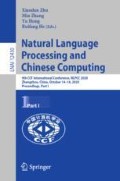Abstract
Most previous models on event coreference resolution largely depend on hand-crafted features and annotated corpora. To address above issues, this paper introduces a neural model to resolve document-level event coreference in raw texts by both employing various neural components to better represent event semantics and integrating data augmentation with reinforcement learning to largely expand the dataset and effectively improve its quality. Experimentation on three KBP datasets shows that our proposed neural model significantly outperforms several strong state-of-the-art baselines.
Access this chapter
Tax calculation will be finalised at checkout
Purchases are for personal use only
References
Bagga, A., Baldwin, B.: Algorithms for scoring coreference chains. In: Proceedings of the First International Conference on Language Resources and Evaluation Workshop on Linguistics Coreference, pp. 563–566 (1998)
Chen, Z., Ji, H.: Graph-based event coreference resolution. In: Proceedings of the 2009 Workshop on Graph-based Methods for Natural Language Processing, pp. 54–57 (2009)
Chen, Z., Ji, H., Haralick, R.: A pairwise event coreference model, feature impact and evaluation for event coreference resolution. In: Proceedings of the Workshop on Events in Emerging Text Types, pp. 17–22 (2009)
Choubey, P.K., Huang, R.: Improving event coreference resolution by modeling correlations between event coreference chains and document topic structures. In: Proceedings of the 56th Annual Meeting of the Association for Computational Linguistics (Volume 1: Long Papers), pp. 485–495 (2018)
Feng, J., Huang, M., Zhao, L., Yang, Y., Zhu, X.: Reinforcement learning for relation classification from noisy data. In: Proceedings of the Thirty-Second AAAI Conference on Artificial Intelligence (2018)
Huang, Y.J., Lu, J., Kurohashi, S., Ng, V.: Improving event coreference resolution by learning argument compatibility from unlabeled data. In: Proceedings of the 2019 Annual Conference of the North American Chapter of the Association for Computational Linguistics: Human Language Technologies, pp. 785–795 (2019)
Li, P., Zhu, Q., Zhou, G.: Argument inference from relevant event mentions in Chinese argument extraction. In: Proceedings of the 51st Annual Meeting of the Association for Computational Linguistics, pp. 1477–1487 (2013)
Liu, Z., Araki, J., Hovy, E.H., Mitamura, T.: Supervised within-document event coreference using information propagation. Proc. LREC 2014, 4539–4544 (2014)
Lu, J., Ng, V.: Event coreference resolution with multi-pass sieves. In: Proceedings of the 10th International Conference on Language Resources and Evaluation, pp. 3996–4003 (2016)
Lu, J., Ng, V.: Joint learning for event coreference resolution. In: Proceedings of the 55th Annual Meeting of the Association for Computational Linguistics, pp. 90–101 (2017)
Luo, X.: On coreference resolution performance metrics. In: Proceedings of the Conference on Human Language Technology and Empirical Methods in Natural Language Processing, pp. 25–32 (2005)
Narayanan, S., Harabagiu, S.: Question answering based on semantic structures. In: Proceedings of the 20th International Conference on Computational Linguistics, pp. 693–702 (2004)
Recasens, M., Hovy, E.: BLANC: implementing the rand index for coreference evaluation. Nat. Lang. Eng. 17(4), 485–510 (2011)
Sonawane, S., Kulkarni, P.: The role of coreference resolution in extractive summarization. In: Proceedings of the 2016 International Conference on Computing, Analytics and Security Trends, pp. 351–356 (2016)
Acknowledgments
The authors would like to thank the three anonymous reviewers for their comments on this paper. This research was supported by the National Natural Science Foundation of China (No. 61772354, 61836007 and 61773276.), and the Priority Academic Program Development of Jiangsu Higher Education Institutions (PAPD).
Author information
Authors and Affiliations
Corresponding author
Editor information
Editors and Affiliations
Rights and permissions
Copyright information
© 2020 Springer Nature Switzerland AG
About this paper
Cite this paper
Fang, J., Li, P. (2020). Data Augmentation with Reinforcement Learning for Document-Level Event Coreference Resolution. In: Zhu, X., Zhang, M., Hong, Y., He, R. (eds) Natural Language Processing and Chinese Computing. NLPCC 2020. Lecture Notes in Computer Science(), vol 12430. Springer, Cham. https://doi.org/10.1007/978-3-030-60450-9_59
Download citation
DOI: https://doi.org/10.1007/978-3-030-60450-9_59
Published:
Publisher Name: Springer, Cham
Print ISBN: 978-3-030-60449-3
Online ISBN: 978-3-030-60450-9
eBook Packages: Computer ScienceComputer Science (R0)


